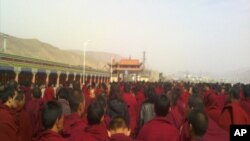A 38-year-old monk, Jamyang Palden, set himself ablaze on Wednesday, 10:30am at Rongwo monastery in Rebkong, Amdo (Chinese: Huangnan Tibetan autonomous prefecture, Tongren County, Qinghai), according to sources in India.
This marks the 28th self-immolation protest to have taken place in Tibetan areas of China since February 2009, and the second one in Qinghai. In nearly all of the protests where eyewitnesses have heard the protestor’s call, before or during the immolations, every one of them had demanded greater freedoms in Tibet and a return of Tibet’s spiritual leader the Dalai Lama to Tibet.
Wednesday’s incident took place in the middle of a square named after Dolma, a Buddhist deity of compassion, which was mainly empty at the time due to a prayer session being in progress. An elderly Tibetan man is reported to have spotted the burning monk and smothered out the flames by hugging him and stamping out the fire with his hands.
Chinese security forces arrived in large numbers to disperse a crowd of several hundred monks and local Tibetans who had converged on the square. A source told VOA that as Palden was taken by security forces and some Tibetans to a hospital, the people in the square, "refused to disperse and instead recited prayers and called for the return of the Dalai Lama to Tibet." A little later in the day, fearing that Palden would be detained and abused by police, he was brought to another place for treatment and then back to the monastery by monks.
VOA Tibetan received still images which show that Palden’s burns appear to be quite serious although his immediate condition is not clear. Of the two video clips received by VOA, one shows around 20 monks surrounding and tending to Palden while chanting the long life prayer to the Dalai Lama. The second video clip shows a large crowd of people in Dolma Square, appearing quite agitated, with some chanting the same prayer, and others audibly calling out that this was a, “a peaceful protest.”
China’s reactions to the Tibetan self-immolations have shifted over time, starting from blaming the Dalai Lama and outside forces, to describing some of the individuals as having personal problems that drove them to the act, and finally to describing all self-immolators as being criminals. The Guardian reported on March 7, ‘Beijing has dismissed Tibetans, young and old, who have set themselves on fire in protest against Chinese rule as criminals or suspicious people with a "very bad reputation".
The Dalai Lama, who has lived in exile in India since 1959, has praised the courage of those who engage in self-immolation but has said he neither encourages them, nor feels that they can have an impact on Chinese leaders. Both he and the elected exile Tibetan leader, Lobsang Sangay, blames Chinese repression of Tibetan culture and religion for the cases.
